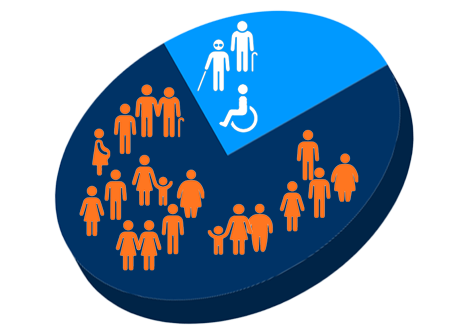Accurate and comprehensive data on Persons with Disabilities (PwDs) is fundamental for effective advocacy, program development, and policy formulation. The significance of this data lies in its ability to provide insights into the specific needs of PwDs, facilitate the allocation of resources, and enable the monitoring of progress towards achieving inclusivity and equity. However, despite its importance, disability data is often incomplete or inadequately managed, leading to gaps in service provision and policy implementation.
To get a clear understanding of these challenges and how to address them, KICTANet attended the Sustainable Development Goals Kenya (SDGs Kenya) Forum training workshop for grassroots organizations and Civil Society Organizations (CSOs) working with persons with disabilities) on the 18th and 19th of July 2024. The training aimed at equipping participants with the necessary knowledge and skills to effectively collect, manage, analyze, and utilize disability data.
During the workshop, the need for data to understand the situation of people with disabilities and advocate for their inclusion was underlined. Speakers highlighted the importance of data collection and evidence-based advocacy, emphasizing the significance of adopting comprehensive and inclusive data collection methods. The discussion also shed light on the imperative of a data-driven approach to advocate for the rights and inclusion of people with disabilities.
Disability Data serves the following purposes:
- Understanding the true situation of persons with disabilities.
- Identifying gaps in inclusion efforts that need to be addressed through policies and other legal frameworks.
- Providing insight into successful initiatives.
- Supporting evidence-based advocacy for policies and identifying gaps to inform decisions.
- It serves as the foundation for all disability advocacy efforts.
Some of the ethical considerations in collecting disability data centre around core values such as dignity, autonomy, equality, and a clear understanding of diversity. It’s important to uphold these values while gathering and handling such sensitive information.
In addition, good practices include adopting accessible data collection methods and systems to ensure inclusivity, avoiding any potential harm that may arise from the data collection process, obtaining voluntary and informed consent from participants, understanding and fulfilling relevant legal responsibilities, and maintaining the highest levels of professionalism, research standards, and competencies throughout the data collection and analysis process. These practices are crucial in ensuring the ethical and responsible collection of disability data.
Key recommendations were framed as questions to help improve data collection and accuracy. These questions are:
- Why haven’t we been able to collect accurate and reliable data on persons with disabilities despite using the Washington Group of questions? What could be the hindrance to collecting disaggregated disability data?
- Could the data collection tools be the barriers themselves?
- How does the context of data collection affect the process? Could traditions, local norms, and culture be barriers to collecting data?
- How about the translation of the Washington Group of questions into local languages and dialects (e.g., Sheng)?
- Given the diversity of disability, can we be certain that all individuals understand and correctly interpret the questions?
The importance of disability data cannot be overstated! It plays a crucial role in understanding the needs of persons with disabilities, advocating for their inclusion, and shaping effective policies and initiatives. Focusing on ethical considerations and addressing key questions about data collection are essential for building a society that is inclusive and fair for everyone.
![]()




